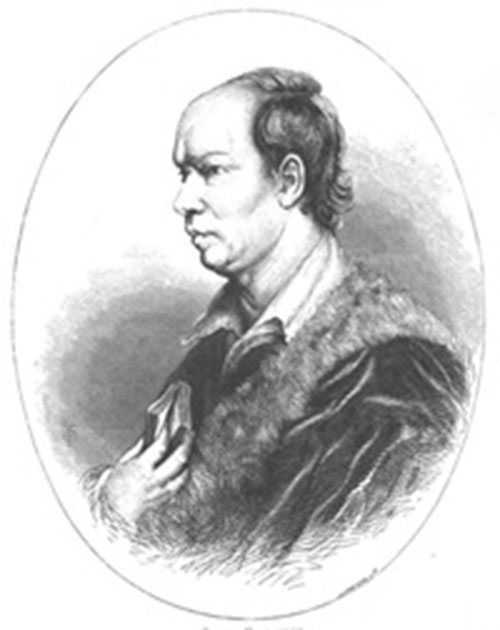Auburn - Irish Pictures (1888)
From Irish Pictures Drawn with Pen and Pencil (1888) by Richard Lovett
Chapter VI: The Shannon … continued
« Previous Page | Start of Chapter | Book Contents | Next Page »
Between Longford and Athlone the Shannon widens out into Lough Ree, a picturesque lake, possessing the broken outline common to loughs formed by the chemical solution of limestone rocks. The banks are well wooded, and the surface of the lake is broken by islands, some of which are exceedingly beautiful. Not very far from the southern end of Lough Ree is the village of Lissory or Auburn, which claims to be the birthplace of Oliver Goldsmith, and which certainly was the scene of his early childhood and youth. He was born at Pallas, in County Longford, in November, 1728, and when the boy was only a few years old, his father, a curate, was presented with the living of Auburn, where he was not simply 'passing rich on forty pounds a year,' after the standard of The Deserted Village, but in fairly comfortable circumstances, for the living was worth about £200 a year. As a boy Oliver Goldsmith had a hard life. He was not attractive in appearance, and the smallpox left most evident traces upon his countenance of the severity with which it had visited him. From Auburn, when he was sixteen, he went up as a sizar to Trinity College, Dublin, and while there he so failed to utilise his time and opportunities that neither the keenest insight nor the liveliest imagination could have predicted that the day would come when the institution in which he had been caned by a tutor would erect, on one of the most prominent sites in the Irish metropolis, a statue to his memory. Goldsmith was a poet and a man of letters, and it has long been recognised that literary men of genius seldom develop in accordance with fixed rule, or in orderly response to academic training.
It has often been supposed that in Goldsmith's famous poem, The Deserted Village, which appeared in 1770, he has sketched Auburn. Lord Macaulay's criticism is probably just: 'It is made up of two incongruous parts. The village in its happy days is a true English village; the village in its decay is an Irish village. He had assuredly never seen in his. native island such a rural paradise, such a seat of plenty, content, and tranquillity, as his Auburn. He had assuredly never seen in England all the inhabitants of such a paradise turned out of their homes in one day, and forced to emigrate in a body to America. The hamlet he had probably seen in Kent; the ejectment he had probably seen in Munster; but, by joining the two, he has produced something which never was and never will be seen in any part of the world.'
« Previous Page | Start of Chapter | Book Contents | Next Page »

